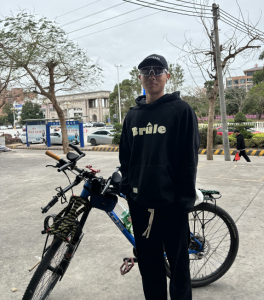Riding a bike on an empty stomach and hungry stomach can bring considerable harm~
Some car enthusiasts deliberately choose to exercise on an empty stomach, thinking that it can help them lose weight, but as a result, they feel dizzy, dizzy, and physically exhausted. When exercising on an empty stomach, blood sugar in the body will decrease, causing headaches, limb fatigue, and even fainting. At the same time, it can also cause hunger, abdominal pain, inhibit digestive secretion, and reduce digestive function, so fasting exercise is not advisable..
The term for fasting cycling is “fasting training”, which mainly refers to consuming only a small amount of carbohydrates free food before starting cycling training..
To prevent the occurrence of hypoglycemia, it is recommended to drink an appropriate amount of concentrated sugar water or eat easily digestible foods with high sugar content before exercising. But whether to eat something before fasting depends on personal feelings, because everyone’s dietary habits, exercise methods, and exercise time are different, and these differences can only be experienced, felt, and grasped by oneself. The important thing is to find the method that suits oneself. During cycling training, the body will use two types of energy storage: liver sugar, which comes from the carbohydrates you consume and is the energy that the body prioritizes for consumption; Fat – This is a relatively stable source of energy in the body. As you gradually adapt to this training mode, while maintaining the same speed or step frequency, your body will become more and more efficient in absorbing energy from fat..
It is advisable to supplement food with 1/3 to 1/2 of the normal food intake before fasting cycling activities (such as morning exercises). In addition, it is important to avoid exercising after a full stomach, and exercise should be scheduled 1.5-2 hours after meals; After exercising, eat 30-45 minutes later. During exercise, a large amount of blood flows from the digestive system to the moving organs..
If you exercise after being full, it will inevitably slow down the digestion and absorption of food in the digestive tract. Over time, it can cause symptoms such as gastritis and indigestion. Moreover, full belly exercise can easily cause abdominal pain during exercise, making exercise unsustainable. So, it is not advisable to exercise on an empty stomach, let alone on a full stomach..
During cycling, when liver sugar is depleted and the body’s carbohydrates are insufficient to continue providing liver sugar, the body is forced to “burn” fat to obtain energy, ensuring efficient energy utilization. Over time, as the body gradually adapts, it will help increase the storage of liver sugar in the body..
Dr. Asker Jeukendrup, a sports nutritionist/exercise physiologist from the University of Loughborough in the UK, suggests fasting and cycling training before breakfast. Generally, 60 minutes is recommended, and the longest should not exceed 90 minutes. When cycling, pay attention to controlling the rhythm to ensure that you can speak without panting..
Eating within 30-60 minutes after cycling, and consuming carbohydrates and protein in a 4:1 ratio (such as peanut butter bread), can effectively supplement carbohydrates. Timely hydration within 60-90 minutes can accelerate recovery..
Fasting training requires more recovery time than regular training, and overtraining can easily harm the body. Dr. Asker Jeukendrup suggests that if you frequently engage in long-distance cycling, fasting training 1-2 times a week is about the same. If you are preparing for a race or undergoing high-intensity training, then don’t do fasting training anymore – even the best driver needs to consume enough carbohydrates to support high-intensity training and cycling..

